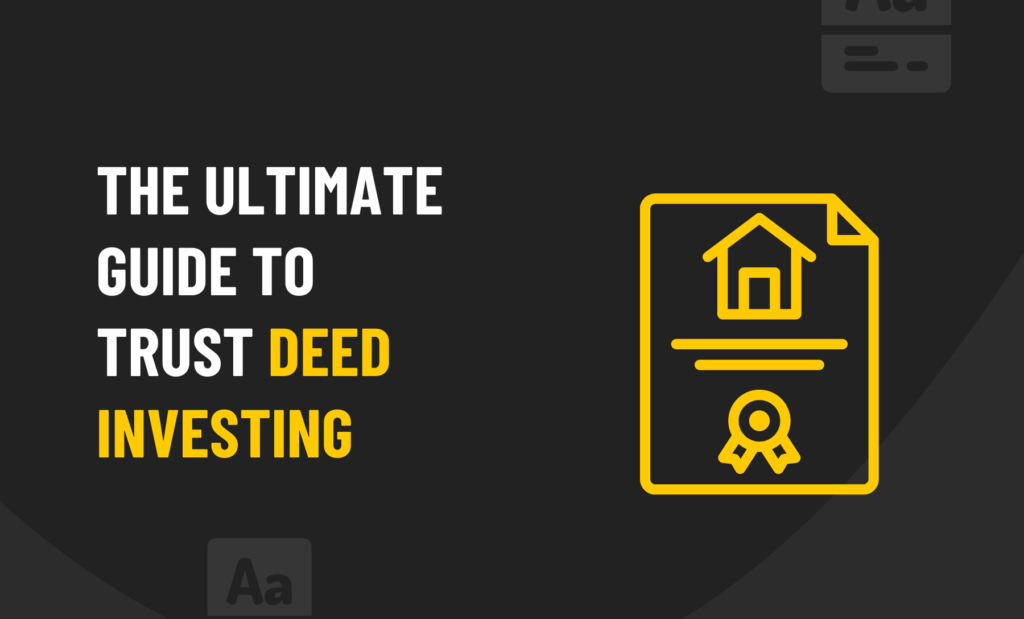
When you invest in trust deeds, you are investing in real estate-secured loans. In most cases, these deed investments are short-term, typically lasting 5 years or less, so you can quickly determine whether or not it was a wise investment.
And since banks typically offer long-term mortgages instead of short-term bridge loans, trust deed investing fills a void in the real estate lending market. Investing in trust deeds becomes an alternative to banks by providing short-term loans secured by real estate.
Follow along with this article to learn more about trust deed investing!
What Is a Trust Deed?
Real estate transactions sometimes involve trust deeds, also known as deeds of trust. The loan agreement is used when one party wants to purchase property with another party. Real estate purchases are still financed by a trust deed investment instead of a mortgage.
Borrowers and lenders create a trust deed when they agree to have their property held by an independent, neutral third party until the trust deed loan is repaid. As a result of a financed real estate loan, a trust deed is used as an instrument for transferring the ownership of a property to a third party, such as a bank, loan servicing company, or title insurance company, to hold it until the borrower repays the debt to the lender.
Understanding Trust Deeds
Three parties are involved in a trust deed; the borrower, also known as a trustee, forms the trust. Trustees are third parties charged with holding property held on trust until the loan or debt is repaid. They take full control of a borrower’s property if the borrower default.
It is important to remember that in a real estate transaction, a lender will give the borrower both the money and the promissory notes attached to the trust deed in exchange for the money.
If a promissory note is made, the transfer of legal title to the real property will be made by a trustee, who will hold it as collateral for the promissory note. The trustee can be an impartial company, such as a title company, escrow company, or bank.
Ownership and use of the property remain firmly in the borrower’s hands, as does the right to acquire full ownership.
Trust Deed vs Mortgage

Banks and private lenders use trust deeds and mortgages to create rights or claims on real estate, and both are recorded as debt in the county where the property is situated. There are, however, a few differences between them.
Number of Parties
Two parties are involved in a mortgage: the borrower or mortgagor and the lender or the mortgagee. Mortgages guarantee repayment by pledging the borrower’s property as security. On the other hand, trust deeds involve three parties: the borrower or trustor, the lender or beneficiary, and the trustee. Trustees maintain title to lien for the lender’s benefit, initiating and completing foreclosure proceedings on behalf of lenders if the borrower defaults.
Type of Foreclosure
Defaults on deeds of trust are handled differently than defaults on mortgages. A court order is required to enforce foreclosure in case of a defaulted mortgage. The trust deed includes a power-of-sale clause; trust deeds can be foreclosed non-judicially.
It costs more and takes longer to foreclose through a judicial process than through a non-judicial process. From the lender’s perspective, this means that deeds of trust are preferable to mortgages in places that allow them.
What Is Included in a Trust Deed?
Similar information will be included in a deed of trust as in a mortgage document. In addition to the borrower’s and lender’s names, the trustee’s name should also be included. Also included are a description of the property and any restrictions or requirements on its use during the trust period.
In addition to the terms of the loan, the deed should specify whether the loan is interest-only or principal-based. It is also important to include the terms of late fees and penalties in case of non-payment. Further, trust deeds include power-of-sale clauses that give trustees the right to sell properties if the borrower defaults.
Pros and Cons of Investing in Trust Deeds

A trust deed is a popular investment option for investors looking for high yields. Investors who invest in trust deeds lend money to developers. On the deed of trust, the investor is named the lender. When the project is completed, the investor receives his principal back in full, with interest rate. Deals are facilitated by an attorney who specializes in trust deed investing.
There are certain risks and disadvantages associated with trust deed investing. Unlike stocks, investors cannot withdraw their money from real estate investments on demand. Investors will also be unlikely to experience any additional capital appreciation other than the interest earned on the loan.
The trust deed investment may be at risk if the invested parties exploit any legal discrepancies in the trust deed, resulting in costly legal entanglements. When finding credible and trustworthy developers, projects, and brokers, a novice trust deed investor will likely have trouble because it requires specialized expertise.
Conclusion
Trust deed investing is becoming an increasingly lucrative investment opportunity for those investing in real estate projects. To kickstart your investment, here are some important details to note about trust deeds:
- There are some areas where trust deeds can replace mortgages.
- Trust deeds place property ownership in the hands of a trustee instead of directly between a lender and a borrower.
- The property cannot be fully transferred to the borrower until the debt has been settled with the lender.
Book a call with Pearl Lemon Invest to get started with your next big real estate investment.
FAQs
What is a trustee's role in a trust?
It is important to remember that the trustee has a key role in a trust deed. The trustee is responsible for the assets and liabilities of the trust. This responsibility varies according to the type of trust that you have. The role of a trustee is to protect the interests of the beneficiaries and to control the property. The trust deed should be clear about who is responsible for what. A trustee is typically a corporate entity or an individual.
How does a trust deed fail?
A trust deed is a legal document that defines the ownership of an asset, such as a house or shares in a company. It is often used to transfer ownership of land, buildings, and other assets. A trust deed can fail if the asset owner does not pay for it or if there is a default on payments made to the owner.
A default on payments means that there has been no payment for a certain period (usually monthly); therefore, it is considered an unpaid debt. If this happens, the owners will be held liable for paying back this hard money loan, or their creditors can sue them.
What are the advantages and disadvantages of trust over a will?
A trust deed is a legal document that transfers real estate ownership. It is an agreement between two or more parties who agree to transfer property ownership to another party. Investing in real estate is a very popular way for people to make money, but it can also be risky. Many people use wills instead of trusts to transfer their property to avoid this risk. A will can help you avoid the problems associated with investing in real estate and other financial products such as stocks and bonds.



